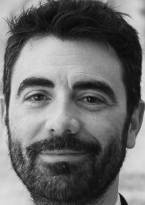a meeting of minds
WHY DID THE POPE PHONE THE PHILOSOPHER?

by
SANTIAGO ZABALA
___________________________________
Santiago
Zabala is
ICREA Research Professor of Philosophy at the University of Barcelona.
His books include The Hermeneutic Nature of Analytic Philosophy
(2008), The Remains of Being (2009) and Hermeneutic
Communism (2011, coauthored with G. Vattimo), all published
by Columbia University Press. His most recent book is
Why Only Art Can Save Us. (2017) This essay
first appeared in aeon.com
This summer, during
the FIFA World Cup, I went with some friends to watch a soccer
game at the house in Turin of the Italian philosopher and former
member of the EU parliament Gianni Vattimo. As soon as our team
began to lose, Vattimo said: ‘Oh, by the way, I forgot to
tell you, the Pope called me yesterday.’
We knew
that Vattimo and the man born Jorge Mario Bergoglio in Argentina
have many friends in common; they were even supposed to be on
the same panel at a conference when Bergoglio was elected to the
papacy in March 2013. And the two recently met in Rome. But the
news distracted us from the game, to say the least. This is something
that one might imagine taking place in a TV drama such as The
Young Pope (2016), but instead it was in the living room of one
of the world’s most important living philosophers.
But why
did the supreme pontiff of the Roman Catholic Church, though he
was certainly rooting for the same team, call up the father of
‘il pensiero debole’ (weak thought), a philosophical
stance centred on weakening political and religious dogmatism,
an urgent matter in the 21st century?
A few
days before the game, the Argentine anthropologist Luis Liberman,
a mutual friend, had brought the Pope a copy of Vattimo’s
new book, Essere e dintorni (2018) or Being and Surroundings.
So Pope Francis decided to call to congratulate Vattimo. Without
diminishing the significance of other surprising calls made by
Francis – to survivors of sexual abuse, to writers critical
of his pontificate, or to astronauts in space – there is
more to this particular phone call than the appreciation of a
book that just mentions him in passing during its examination
of contemporary philosophical problems related to such dark thinkers
as Friedrich Nietzsche and Martin Heidegger.
Beside
the interest both men share in the reformation of the Church and
alarm over capitalism’s destructive forces, there is a particular
attitude toward religion that unites them. This attitude is evident
in the philosopher’s interpretation, and the first Jesuit
Pope’s practice, of Christianity.
Although
Vattimo has been a supporter of Francis since his election, his
particular interpretation of religion goes back to the 1990s,
when Vattimo began to apply his philosophy to the possibility
of a nonreligious Christianity. This expression refers to a faith
without foundations, that is, free of the power-laden relation
with God that traditional theology always imposed upon believers
through the Church.
Vattimo
justifies this interpretation through the biblical concept of
kenosis (the self-emptying, incarnation, or weakening of God),
and he uses this concept to dismiss the Church’s eternal
connection of God with Truth. This association is at the origin
of the ecclesiastical establishment’s conservative stance
toward matters concerning gender, sexuality and procreation. Against
this association, Vattimo calls for a nonreligious Christianity,
where the pope and the Church substitute charity for truth.
The weakening
of divine transcendence and sovereignty – which are figures
of violence for the Italian philosopher – leads to softening
the faith and encouraging believers to doubt the authority of
sacred texts, the Church and, most of all, the pope. But when
Francis responds to questions about ‘gay believers’
with a simple ‘Who am I to judge?’ or agrees that
‘there must be more’ women in key roles in the governing
body of the Church, he is inviting us not only to doubt these
principles but also to change our attitude toward religion.
This
attitude is not meant to doubt the existence of God but rather
to recall, as Francis wrote in Rejoice and Be Glad (2018),
how ‘Christianity is meant above all to be put into practice.’
This practice is manifest both in his small gestures when he carries
his own bags on planes and his big plans for a decentralized Church
where environmentalism is at the forefront of the faith’s
mission. But why has this softer attitude toward believers and
nonbelievers from all over the world infuriated conservatives
to the point of waging a war against him within the Church?
It should
come as no surprise that Vattimo and Francis share similar enemies:
ecclesiastical intellectuals and conservative cardinals. Their
call for a different attitude and practice of Christianity does
not undermine theological discussions over the existence of God
as much as it undermines the excuse those intellectuals and cardinals
rely on to preach on abortion, homosexuality or morality.
Despite
these enemies, when Francis began to reorient the Church toward
climate change, financial reform and charitable refugee policies,
he became, as Vattimo pointed out, ‘one of those rare figures
in the world, perhaps the only one, capable of guiding a radical
transformation of the social and economic order.’ Although
Vattimo does not pretend that Francis will become the chief of
a communist movement, considering that he is tied to the faith’s
orthodoxy, he seems to be the only world figure today capable
of confronting the various Right-wing populists emerging to impose
nationalist and xenophobic policies.
It is
difficult to imagine that the spiritual leader of more than a
billion Roman Catholics did not know that a renowned gay, communist
philosopher had been supporting his pontificate over the years.
His calling Vattimo wasn’t meant to thank him for his support
or for providing philosophical justifications of his humble religious
attitude. Rather, it was another measure meant to continue the
weakening of those religious, political and cultural dogmas that
are so vital to his enemies.